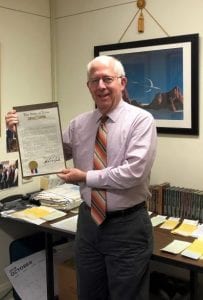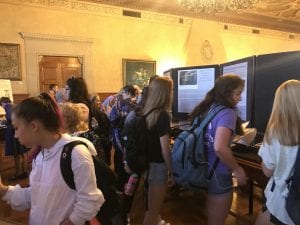Melvin Schuetz, the Armstrong Browning Library’s assistant to the curators, is having an amazing year!
The documentary he co-produced on space artist Chesley Bonestell, Chesley Bonestell: A Brush with the Future, made its debut at the Newport Beach Film Festival in May and took home the Audience Award in the Art, Architecture, and Design category. The film then went on to win Best Documentary at the Comic-Con International Independent Film Festival in San Diego, California, in July. In October, Melvin received a resolution from the State of Texas congratulating him on the success of his documentary and commending him for his expertise and contributions to the film.
Chesley Bonestell: A Brush with the Future will screen this Monday, October 29, at 7:00 pm at the Waco Hippodrome as part of Baylor Student Activities’ “Movie Mondays.” The screening is already SOLD OUT, but the trailer can be viewed below.
The Armstrong Browning Library is proud of Melvin for his hard work and success!
To learn more about Melvin, his interest in Bonestell and space, and his involvement with Chesley Bonestell: A Brush with the Future, visit the following links:
Eric Ames. “Documentary Co-Producer Melvin Schuetz Talks Chesley Bonestell and ‘Chesley Bonestell: A Brush with the Future.’” Promoting Discovery: Presenting Stories from the Baylor University Libraries. Updated May 31, 2018.
Carl Hoover. “Sci-fi documentary aided by Baylor assistant to curators gets Comic-Con screening.” Waco Tribune-Herald. July 19, 2018.
Carl Hoover. “Baylor library worker co-produces Comic-Con prize-winning documentary.” Waco Tribune-Herald. July 29, 2018.
Liesbeth Powers. “Bonestell Film Gains Momentum Throughout the Summer.” Baylor Media Communications. August 8, 2018.
Carl Hoover. “Space movies coming to Waco screens, plus ‘Neighbor,’ ‘RBG.’” Waco Tribune-Herald. August 22, 2108.
“Waco Showing Scheduled for ABL Staff Member’s Award-Winning Documentary.” Baylor University Libraries. October 11, 2018.




